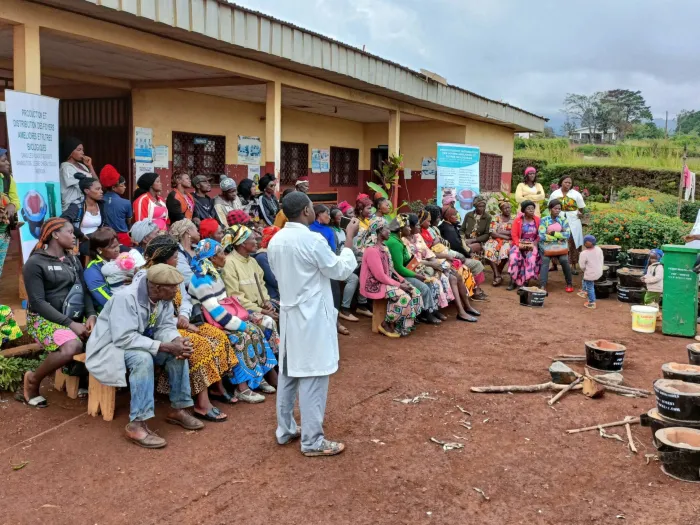Those struggling against inequality need to know they are not alone
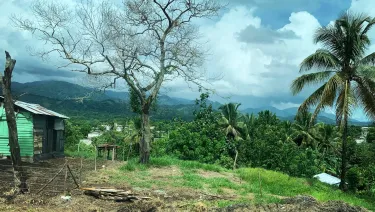
On a March, 2024 trip to El Salvador to visit members of our Joining Hands network there, Asociación Red Uniendo Manos El Salvador (ARUMES), I was asked to offer prayers for people in pain.
Rosalía Lopez de Grande and her family live within an arm’s reach of sugar cane fields. Every man in her family has worked in the fields, carrying loads of chemicals to treat the crops, hiding to avoid those toxins dropped by helicopter or drone, and covering their faces from the heavy smoke as sugar cane is burned before being harvested.
Rosalía has buried her husband and three of her seven sons since 2012. They all died after being diagnosed with chronic kidney disease. Her son Oscar travels four hours for dialysis twice a week.
The remaining three men refuse to be tested for fear of knowing they likely will die from the illness.
Sugar cane is the predominant crop grown in El Salvador. The country is the 8th largest exporter of sugar in the world and the second largest in Central America.
Refined sugar sits on just about every breakfast table in the U.S.
Rosalía’s family is only one of many tragically sacrificed for a simple, ordinary sweetness.
ARUMES has joined a number of other organizations in an advocacy campaign called Azúcar Amargo.
Bitter Sugar.
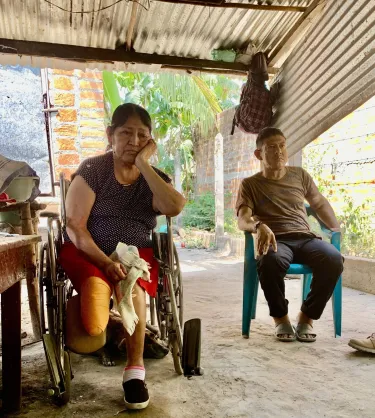
I doubt I will forget sitting in the open-air kitchen at Rosalía’s small house. She uses a wheelchair after losing her right leg to infection. She sat beside her son Oscar who told us about rigorous trips for dialysis. She listened while he said he lost of his fear of speaking out, even though the well-established wealthy sugar cane companies minimize the risks of the sugar cane workers.
“I do not want any other family to go through this,” he said firmly.
I am hearing so many stories like this one from people living similar experiences around the world, now that I am serving in my new role as a catalyst for land, food and agribusiness concerns with the Global Solidarity Collective, which expands upon the foundational work of the Joining Hands initiative of the Presbyterian Hunger Program (PHP).
Before I began traveling in 2024, and indeed, moving to the Dominican Republic recently, these words in my new title were just words. Jumbled syllables that didn’t mean much. That is until I met more leaders advocating for rights to land and food within their own communities and nations.
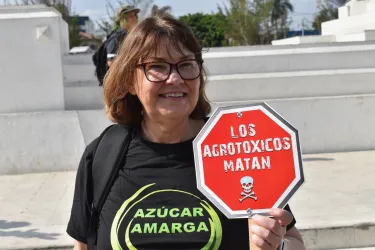
I am a mission co-worker, first sent by PC(USA) World Mission to Haiti in 2013 as a companionship facilitator with our Presbyterian Hunger Program partner FONDAMA. In 2020, I moved back to the U.S. like other mission co-workers due to the Covid-19 pandemic, moving back to Virginia and working remotely. And then unfortunately the violence of political discord and unrest in Haiti made it impossible for my return.
I arrived in the Dominican Republic in late July, settling in Santo Domingo and meeting up with partners here. Just across the border lies Haiti, a place I called home for seven years, and among people I continue to serve.
My work is now more complex than it was when I left Haiti. Then I served as facilitator for a network of grassroots organizations, all of them individually and collectively working toward the right of all to have access to food and clean water.
The work through Joining Hands has evolved to a wider approach, working closely with leaders of similar networks in other countries addressing the same issues. It’s exciting and challenging.
And it is often difficult to describe.
Last week, I met with men and women who live in a Batey near Monte Plata, Dominican Republic. Bateyes are neighborhoods of primarily Haitian-born people living in the country. The poverty in these places is astronomical. Saturnino Perez, coordinator of Juventud Empoderada para la Transformacíon met with the community and explained what it would take to build an agricultural program in the region. I am privileged to meet with communities in these regions.
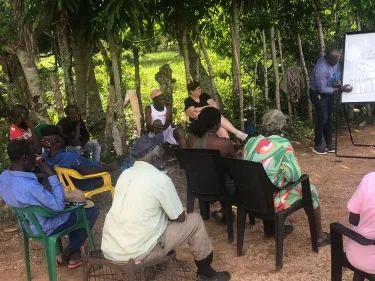
In the Global Solidarity Collective, our core group of organizers are Valery Nodem, the Associate for International Hunger Concerns and Eileen Schuhmann the Associate for Global Engagement and Resources with PHP, and Jed Koball, a fellow mission co-worker and catalyst for extractives, human rights and the environment and myself. Together, we gather people who are resisting systems of oppression and working toward a better life in their communities together.
The collective includes our Joining Hands networks in Haiti, Peru, El Salvador, Democratic Republic of Congo, Cameroon and Sri Lanka, as well as other international partners, and groups and individuals working on these issues in the U.S.
We call it solidarity.
Our colleague Fabienne Jean calls it working together.
“Do you know what makes people want to work together?” she asks.
“When they can come together and share their pain.”
Join us to share in the suffering, to pray for justice, to work toward the Abundant Life for us all.
The work of the Presbyterian Hunger Program is possible thanks to your gifts to One Great Hour of Sharing.
You may freely reuse and distribute this article in its entirety for non-commercial purposes in any medium. Please include author attribution, photography credits, and a link to the original article. This work is licensed under a Creative Commons Attribution-NonCommercial-NoDeratives 4.0 International License.




